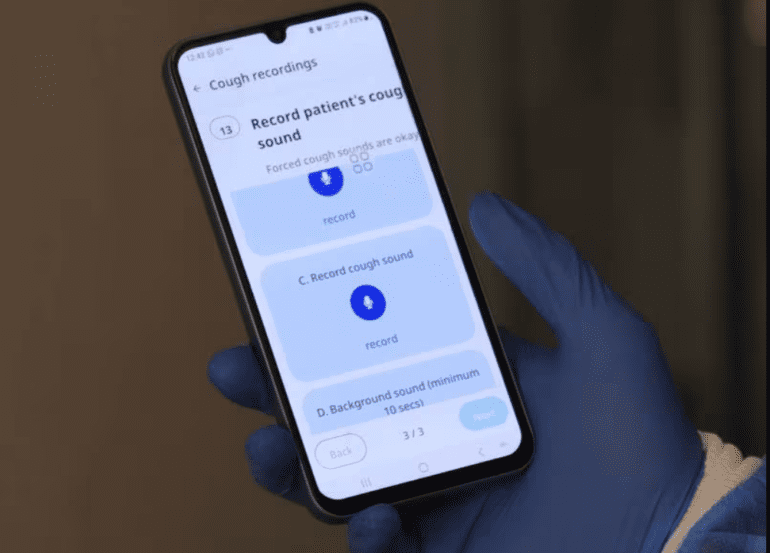TL;DR:
- A mobile app called “Cough Against TB” uses AI technology and is revolutionizing TB detection in India’s Kashmir region.
- The app analyzes cough sounds against a dataset of TB-positive and TB-negative coughs, providing rapid and effective screening.
- Dr. Adfar Yaseen leads the effort to train healthcare workers to use the app, highlighting its efficiency, which is comparable to X-rays.
- Wadhwani Institute for Artificial Intelligence developed the technology with support from the United States Agency for International Development.
- India’s ambitious goal is to eradicate TB by 2025, with 23% of global TB cases reported in the country.
- The app serves as a vital first-line detection system, especially in remote areas with limited resources.
- It empowers healthcare workers to make informed decisions on further testing, which is crucial in regions like Kashmir.
- Despite the challenging environment, Kashmir has made significant progress in TB control through effective screening.
- Vigilance remains essential to prevent TB resurgence in the region.
Main AI News:
For decades, the battle against tuberculosis (TB) in India’s Jammu and Kashmir region has been an arduous one for Dr. Adfar Yaseen. The challenging terrain and a month-long wait for test results once plagued the efforts to combat this infectious disease in the northernmost part of the country. However, a remarkable technological transformation has significantly bolstered India’s prospects for eradicating TB, thanks to the integration of artificial intelligence (AI) into healthcare.
The game-changer in this fight comes in the form of a mobile application known as “Cough Against TB.” This innovative app harnesses the power of AI to revolutionize early TB detection, offering new hope to potential patients. The application screens for the disease by analyzing a patient’s cough against a dataset containing nearly 15,000 TB-positive and TB-negative cough sounds.
Dr. Yaseen, who leads Kashmir’s tuberculosis treatment division, is spearheading a program aimed at training doctors and healthcare workers to effectively utilize this app. She asserts that it is as effective as an X-ray in detecting TB, particularly in hard-to-reach areas where access to conventional diagnostic tools like X-rays is limited.
The process involves converting audio inputs into spectrograms, which are then analyzed by a network trained to predict the likelihood of a patient having the disease. This cutting-edge technology is developed by the Wadhwani Institute for Artificial Intelligence, an AI partner of the Indian government’s Central TB Division.
Wadhwani states, “For every 2.8 TB cases prevalent in the community, one case gets notified, and 1.8 cases get missed.” Supported by the United States Agency for International Development, this partnership exemplifies how AI can transform healthcare and make significant strides in combating deadly diseases.
The Cough Against TB app is just one facet of India’s expanding efforts to enhance TB surveillance and testing. Tuberculosis is a perilous disease caused by airborne bacteria, transmitted when infected individuals cough, spit, or sneeze. Left untreated, TB has a staggering 50% mortality rate and requires a lengthy and regular medication regimen.
According to the World Health Organization, approximately 1.3 million people succumbed to TB in 2022, making it the second-leading infectious killer after Covid-19. India, with its ambitious goal to eradicate TB by 2025, faces a monumental challenge, considering that 23% of the 10.6 million global TB cases in 2022 were reported in the country.
Rouf Ahmad Tramboo, supervisor of the TB Centre in Kashmir’s Budgam district, hails the app as a first-line detection system, providing a presumptive diagnosis that can later be confirmed through additional tests. Its efficiency is especially crucial in remote areas where access to basic amenities, such as electricity, can be scarce.
The app will be deployed among grassroots healthcare workers, who will receive training to utilize it effectively. Mr. Tramboo emphasizes that the app not only generates results but also empowers healthcare workers to make informed decisions regarding the need for further testing.
In the picturesque Himalayan valley of Kashmir, where frigid winters and frequent respiratory ailments are the norm, timely self-reporting of tuberculosis is often a challenge. However, the region has achieved remarkable success in the fight against TB, with several districts being declared TB-free. Doctors attribute this progress to spacious living conditions and healthy dietary habits.
Dr. Yaseen emphasizes the need for effective screening to reduce TB incidence in the region further, as the threat of a resurgence of infections is ever-present. She stresses the importance of vigilance, stating, “We just can’t sit back; we have to be vigilant.“
Conclusion:
The integration of AI technology through the “Cough Against TB” app is a significant breakthrough in the fight against tuberculosis in India’s Kashmir region. This innovation not only enhances early detection and diagnosis but also empowers healthcare workers in resource-constrained areas. As India strives to meet its ambitious TB eradication goal by 2025, such technological advancements are poised to play a pivotal role in transforming the healthcare market by making TB control more accessible, efficient, and effective.

